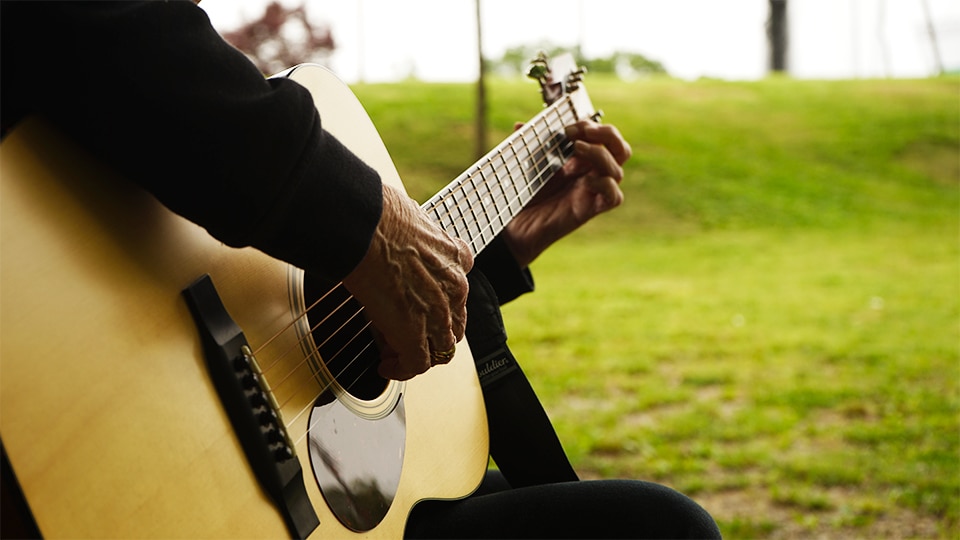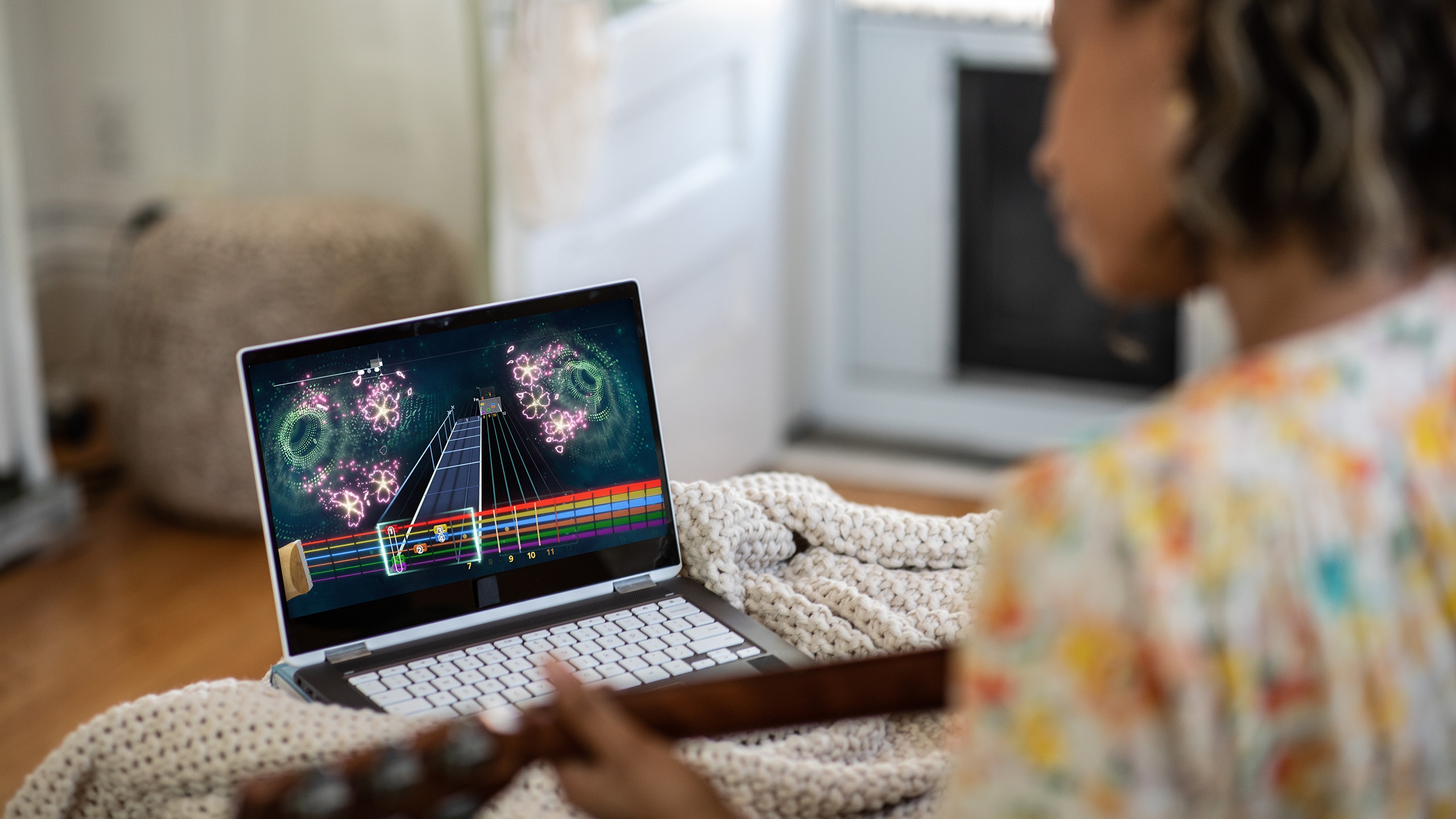Everyone who plays guitar remembers the magic of picking up an instrument for the first time: the possibilities, the excitement to learn to play your favorite songs, the potential to join a band and play guitar for people. What many also remember is the frustration: the sore fingers, the slowness of getting the first few concepts, and mastering the dreaded barre chords. Being a guitar beginner can be daunting but the rewards - and the journey itself - make learning to play worth it. These tips will help keep you motivated and making progress, even during the first few weeks. Here are 8 beginner tips to learn to play guitar:
1. First, define your goals.
What made you decide to pick up your guitar in the first place? Do you want to learn to play a particular song, or play in a band, or go to music school, or write an award-winning album? No matter how big your dreams are, you can break the guitar learning process down into manageable steps if you know what your goal is. Set something attainable to start - maybe you want to play guitar at an open mic within a year and need to learn three songs to fill the time slot. Or you want to learn a loved one's favorite song and surprise them on their birthday. Once you have a goal, you can set a deadline and work backward to see how much time and effort you'll need to put in on a regular basis to see results. If you know why you're practicing, you'll be able to keep going even on days when you don't really want to.
![[RS+] - How to Start Playing Guitar v2 - image 2](http://staticctf.ubisoft.com/J3yJr34U2pZ2Ieem48Dwy9uqj5PNUQTn/555NwG9Bi7ge2skM5AE28m/d8841140509ce3d9d2cdd2356f8fae73/tx_ar_howtostartlearningguitar_pic_02.jpg)
2. Be consistent.
Just like studying for a test over the course of a week instead of cramming the night before will get you better results, practicing every day (or as consistently as possible) will speed up your progress. Even if you can only practice your guitar for a few minutes a day, if you make a point of doing it every day, you're more likely to keep going. Once you've made practicing a habit you enjoy, it becomes easier to practice longer and work on more ambitious skills. It might not seem like you're making huge strides from one day to the next, but you'll be amazed at how far your guitar skills can progress in a month or two, let alone a year. And if you miss a day, remember - in terms of the big picture, missing one day won't ruin your progress, so don't stress about it. Start again the next day and keep going from there. That way, you can keep the joy alive and avoid burnout.
![[RS+] - How to Start Playing Guitar v2 - image 3](http://staticctf.ubisoft.com/J3yJr34U2pZ2Ieem48Dwy9uqj5PNUQTn/K0z6K4eVnqNxKnNsdcgvw/d977cf3b8ad6f21b75b8b23a6de3cfea/tx_ar_howtostartlearningguitar_pic_03.jpg)
Set your habits to reach your goals, and make them something you can stick to.
3. Reduce friction.
Anything that stands between you and your guitar will make it harder to practice. If possible, leave the guitar out of its case when it's at home, and if you can leave your practice space set up, do it! A guitar you can see is a guitar you will play, and without having to set up your practice space and tear it down again, you can sneak in more moments throughout the day where you're actually getting your fingertips on the strings. Similarly, keep any supplies you might need on a regular basis on hand so you aren't waiting on a trip to the store or for a shipment to come before you can comfortably play again.
https://www.ubisoft.com/en-us/game/rocksmith/plus/news-updates
Keep these tools handy so you always have what you need to practice.
4. Make yourself comfortable.
It might seem obvious, but you don't need to suffer to learn to play guitar. Use a comfortable chair that's a good height for playing and consider a guitar strap even if you play sitting down. It will help to hold the instrument steady so there's one less worry while you're figuring out where the notes are. Practicing for longer stretches, just like anything else, can also cause muscle aches and sore joints, so be sure to take regular breaks and stretch so practicing doesn't literally become a pain.
5. Get a buddy.
Accountability is critical to maintaining enthusiasm for practicing. Whether it's a teacher, band mate, sibling or friend, or even a practice journal you keep for yourself, tell someone what your goals are and ask them to help you meet them. Having that external motivation can be the push you need when you're tempted to take too many days off. Other more experienced players also can help you out if you run into a concept that you don't understand or an exercise that's giving you trouble.
![[RS+] - How to Start Playing Guitar v2 - image 4](http://staticctf.ubisoft.com/J3yJr34U2pZ2Ieem48Dwy9uqj5PNUQTn/6HnpqfHNxCYiQQreqWonjc/d4983f0930d4316d532e771f04e4713e/tx_ar_howtostartlearningguitar_pic_04.jpg)
6. Learn the basics.
There are a few fundamental concepts everyone should know. Learn your basic chords and a couple basic scales. Start working toward having a couple favorite songs down from start to finish. Start learning some of your favorite riffs. There's nothing better than finally attaining a smaller milestone on the way toward your big goals. You can try the beginner guitar lessons in Rocksmith+ to learn more about beginner guitar chords, techniques, and styles. Try these articles for further reading:
7. Learn more about the songs you're working on.
Reading about the songs you're learning to play can add context, and even help you understand a style or technique better. Being able to speak comfortably about artists you like can help to make friends in your local music community, or even find band mates, so stay curious! Here are a few articles to try:
How Dolly Parton Saved Kenny Rogers' "Islands in the Stream"
Classical Structure, Flamenco Style: Al Di Meola's "Fantasia Suite for Two Guitars
Peter Tosh, "Downpressor Man," and the Song's Unexpected Journey
The Sweet Chaos of "Ballroom Blitz"
8. It's okay to make mistakes.
Ultimately, learning to play guitar is YOUR journey. As with learning any new skill, some days will be easier than others; if you try something and struggle, it's okay! Take note of what world-class athletes and artists say again and again: if you can enjoy the process, then you will be able to keep up the work you need to do to advance. We all want quick results, but if you can find a way to enjoy the slower parts of learning - the repetitive exercises, finding and fixing mistakes, and making that slow progress toward bigger goals, not only will you get there faster; you'll enjoy each step of the way. Happy practicing!
Margaret Jones is a multi-instrumentalist, songwriter, and music teacher living in Oakland, CA. She plays guitar in several local bands including her own songwriting project M Jones and the Melee. She also holds a Ph.D. in Music History from UC Berkeley and has taught at the San Francisco Conservatory of Music.*
"Writing Letter Hand" by Kristen Hardwick is licensed under CC0 1.0.
"guitar shot" by Gianni Brocato is licensed under CCO 1.0.
"monochrome guitar player" by Marcus Spiske is licensed under CC0 1.0.
"man, rock, music, play..." by px here is licensed under CC0 1.0.









